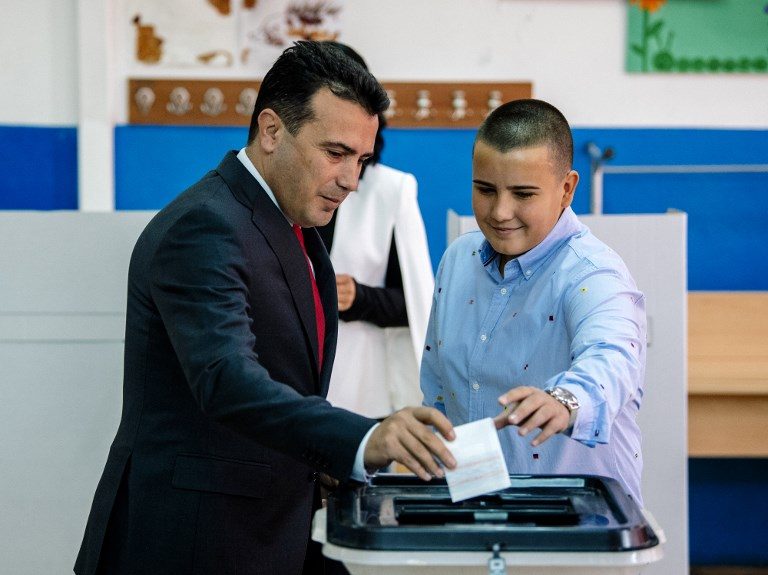SUMMARY
This is AI generated summarization, which may have errors. For context, always refer to the full article.

SKOPJE, Macedonia – Macedonians cast ballots Sunday, September 30, on whether to rename their country North Macedonia, a bid to settle a long-running row with Greece and unlock a path to North Atlantic Treaty Organization (NATO) and European Union (EU) membership.
It is an emotional moment for a country that has struggled for recognition of its name since its birth in 1991, when the former Yugoslav republic declared independence.
Athens protested immediately, accusing Skopje of stealing the name of its own northern province also called Macedonia.
The dispute dives deep into history, with both countries vying for claims to Alexander the Great’s ancient empire of Macedon, which spanned their territories.
But in June, Macedonia’s new premier Zoran Zaev and his Greek counterpart Alexis Tsipras reached a landmark compromise under which Athens would drop its objections to Macedonia joining the EU and NATO in return for the name change.
Zaev is billing the vote as a painful but historic opportunity to break the 27-year-old stalemate.
“Today is a beautiful day, a beautiful holiday for the country. Today the citizens are going out to decide on their future,” Zaev told the press after casting his ballot in his hometown of Strumica, an eastern city where he was once mayor.
Voters began trickling in to schools and other polling stations around the country after polls opened at 7am (0500 GMT).
“I hope that the result will be positive. This referendum will change something if it opens the door to Europe and NATO,” Olivera Argirovska, a 74-year-old retired nurse, told AFP after casting her ballot in a high school in the capital Skopje.
“It will change things for the youth.”
Few Macedonians are enthused about the new name, saying they have been unfairly bullied by Greece.
But a desire to anchor their future to the West – and the economic prosperity that it could bring – is a driving force behind the “yes” vote in one of Europe’s poorest nations.
“We cannot really say it is fair, but the EU and NATO matter more for all of us, so let’s move forward,” 28-year-old Abedin Memeti said ahead of the vote.
Boycott
The referendum is not binding, but a “yes” majority would give parliament a political mandate to change the constitution.
If the deal is backed in the referendum and is ratified by two-thirds of MPs, the Greek parliament will be called on to give the final stamp of approval.
Sunday’s vote is being watched closely across the border in Greece, where nationalists staged a protest against the deal earlier this month.
“We hope for a positive outcome for the proceedings to progress with the constitutional review,” Greece’s government spokesman Dimitris Tzanakopoulos said on the radio.
“Any other result would create a disturbance,” he added.
While the Macedonian government plans to call any significant majority in favor of the deal a success, the right-wing opposition may question the vote’s credibility if turnout is below 50 percent.
Some critics of the name deal have been calling for a boycott, including President Gjorge Ivanov, who is allied with the nationalist opposition.
Massive emigration in recent decades could also affect turnout numbers, with nearly a quarter of the 2.1 million population estimated to live abroad.
Less than 3,000 of those overseas have signed up to vote.
Western Balkans foothold
Europe and the US have campaigned hard for the deal, with many leaders passing through Skopje this month to urge Macedonians to seize the “historic” opportunity.
NATO has already issued an invite – on hold until the deal passes – while EU accession talks are scheduled to begin next year.
The West is keen to have another foothold in the Western Balkans, a region where Russia, which is opposed to NATO expansion, has historically had influence.
At home, those in favor of the deal say a desire for an EU future is helping bind ethnic Macedonians with the Albanian minority, who are broadly pro-West.
While Macedonia avoided the full-scale inter-ethnic wars that rippled across the region during the collapse of Yugoslavia, it was roiled by an Albanian insurgency in 2001 that left more than 100 dead.
A peace deal was reached later that year granting Albanians more political rights, but tensions have remained.
“This is the first time I am seeing Macedonians and Albanians campaigning together for common goals,” Besa Arifi, a law professor, told AFP.
“This will give us more opportunities to unite all citizens around shared values,” he added. – Rappler.com
Add a comment
How does this make you feel?





There are no comments yet. Add your comment to start the conversation.